Deck 2: Differentiation
Question
Question
Question
Question
Question
Question
Question
Question
Question
Question
Question
Question
Question
Question
Question
Question
Question
Question
Question
Question
Question
Question
Question
Question
Question
Question
Question
Question
Question
Question
Question
Question
Question
Question
Question
Question
Question
Question
Question
Question
Question
Question
Question
Question
Question
Question
Question
Question
Question
Question
Question
Question
Question
Question
Question
Question
Question
Question
Question
Question
Question
Question
Question
Question
Question
Question
Question
Question
Question
Question
Question
Question
Question
Question
Question
Question
Question
Question
Question
Question

Unlock Deck
Sign up to unlock the cards in this deck!
Unlock Deck
Unlock Deck
1/84
Play
Full screen (f)
Deck 2: Differentiation
1
Find an equation of the line that is tangent to the graph of f and parallel to the given line.
 ,
, 
A) 
B) 
C) 
D) 
E) none of the above
 ,
, 
A)

B)

C)

D)

E) none of the above


2
Determine the point(s),(if any),at which the graph of the function has a horizontal tangent.

A) 0
B) 0 and 3
C) 0 and -3
D) 3
E) There are no points at which the graph has a horizontal tangent.

A) 0
B) 0 and 3
C) 0 and -3
D) 3
E) There are no points at which the graph has a horizontal tangent.
3
3
Find the derivative of the function 
A) 
B) 
C) 
D) 
E) 

A)

B)

C)

D)

E)



4
Find an equation of the line that is tangent to the graph of f and parallel to the given line.
 ,
, 
A) 
B) 
C) 
D) 
E) both B and D
 ,
, 
A)

B)

C)

D)

E) both B and D

Unlock Deck
Unlock for access to all 84 flashcards in this deck.
Unlock Deck
k this deck
5
Differentiate the given function.

A) 
B) 
C) 
D) 
E) 

A)

B)

C)

D)

E)


Unlock Deck
Unlock for access to all 84 flashcards in this deck.
Unlock Deck
k this deck
6
Find the derivative of the function.

A) 
B) 
C) 
D) 
E) none of the above

A)

B)

C)

D)

E) none of the above

Unlock Deck
Unlock for access to all 84 flashcards in this deck.
Unlock Deck
k this deck
7
Find the derivative of the function.

A) 
B) 
C) 
D) 
E) none of the above

A)

B)

C)

D)

E) none of the above

Unlock Deck
Unlock for access to all 84 flashcards in this deck.
Unlock Deck
k this deck
8
Find the slope of the tangent line to the graph of the function below at the given point.  ,
, 
A) 4
B) -4
C) -2
D) 6
E) none of the above
 ,
, 
A) 4
B) -4
C) -2
D) 6
E) none of the above

Unlock Deck
Unlock for access to all 84 flashcards in this deck.
Unlock Deck
k this deck
9
For the function given,find 

A) 
B) 
C) 
D) 
E) 


A)

B)

C)

D)

E)


Unlock Deck
Unlock for access to all 84 flashcards in this deck.
Unlock Deck
k this deck
10
Find the derivative of the function 
A) 
B) 
C) 
D) 
E) 

A)

B)

C)

D)

E)


Unlock Deck
Unlock for access to all 84 flashcards in this deck.
Unlock Deck
k this deck
11
Find the derivative of the function.

A) 
B) 
C) 
D) 
E) 

A)

B)

C)

D)

E)


Unlock Deck
Unlock for access to all 84 flashcards in this deck.
Unlock Deck
k this deck
12
Identify a function f(x)that has the given characteristics and then sketch the function.  ;
;  ;
; 
A) 
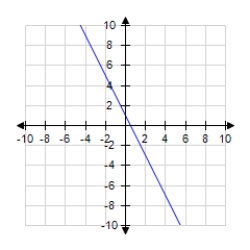
B) 
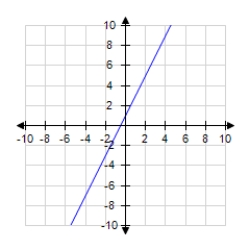
C) 
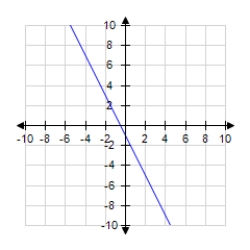
D) 
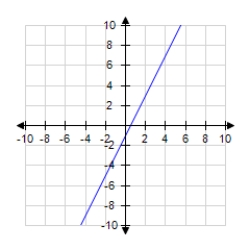
E) 
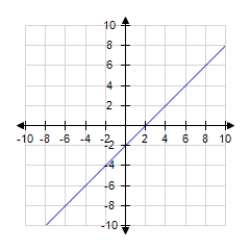
 ;
;  ;
; 
A)


B)


C)


D)


E)



Unlock Deck
Unlock for access to all 84 flashcards in this deck.
Unlock Deck
k this deck
13
Find the derivative of the following function using the limiting process. 
A) 
B) 
C) 
D) 
E) either B or D

A)

B)

C)

D)

E) either B or D

Unlock Deck
Unlock for access to all 84 flashcards in this deck.
Unlock Deck
k this deck
14
Find the slope of the tangent line to the graph of the function below at the given point.  ,
, 
A) -12
B) -2
C) 10
D) -18
E) none of the above
 ,
, 
A) -12
B) -2
C) 10
D) -18
E) none of the above

Unlock Deck
Unlock for access to all 84 flashcards in this deck.
Unlock Deck
k this deck
15
Find the derivative of the function.

A) 
B) 
C) 
D) 
E) none of the above

A)

B)

C)

D)

E) none of the above

Unlock Deck
Unlock for access to all 84 flashcards in this deck.
Unlock Deck
k this deck
16
Find the slope of the tangent line to the graph of the function below at the given point.  ,
, 
A) 12
B) -3
C) -8
D) -12
E) none of the above
 ,
, 
A) 12
B) -3
C) -8
D) -12
E) none of the above

Unlock Deck
Unlock for access to all 84 flashcards in this deck.
Unlock Deck
k this deck
17
Find the derivative of the following function using the limiting process. 
A) 2
B) 
C) 
D) 
E) none of the above

A) 2
B)

C)

D)

E) none of the above

Unlock Deck
Unlock for access to all 84 flashcards in this deck.
Unlock Deck
k this deck
18
Differentiate the given function. 
A)
B)
C)
D)
E)

A)

B)

C)

D)

E)


Unlock Deck
Unlock for access to all 84 flashcards in this deck.
Unlock Deck
k this deck
19
Find the derivative of the following function using the limiting process.

A) 
B) 
C) 
D) 
E) none of the above

A)

B)

C)

D)

E) none of the above

Unlock Deck
Unlock for access to all 84 flashcards in this deck.
Unlock Deck
k this deck
20
Use the limit definition to find the slope of the tangent line to the graph of  at the point
at the point 
A) 
B) 
C) 
D) 
E) 
 at the point
at the point 
A)

B)

C)

D)

E)


Unlock Deck
Unlock for access to all 84 flashcards in this deck.
Unlock Deck
k this deck
21
The graph shows the number of visitors V to a national park in hundreds of thousands during a one-year period,where  represents January.Estimate the rate of change of V over the interval
represents January.Estimate the rate of change of V over the interval  Round your answer to the nearest hundred thousand visitors per year.
Round your answer to the nearest hundred thousand visitors per year. 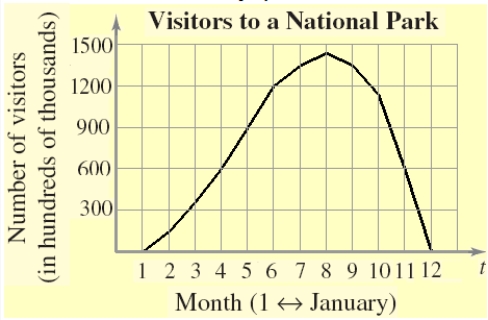
A) 187.5 hundred thousand visitors per year
B) 281.25 hundred thousand visitors per year
C) 225 hundred thousand visitors per year
D) 562.5 hundred thousand visitors per year
E) 1125 hundred thousand visitors per year
 represents January.Estimate the rate of change of V over the interval
represents January.Estimate the rate of change of V over the interval  Round your answer to the nearest hundred thousand visitors per year.
Round your answer to the nearest hundred thousand visitors per year. 
A) 187.5 hundred thousand visitors per year
B) 281.25 hundred thousand visitors per year
C) 225 hundred thousand visitors per year
D) 562.5 hundred thousand visitors per year
E) 1125 hundred thousand visitors per year

Unlock Deck
Unlock for access to all 84 flashcards in this deck.
Unlock Deck
k this deck
22
The population P ( in thousands)of Japan from 1980 through 2010 can be modeled by  where t is the year,with
where t is the year,with  corresponding to 1980.Determine the population growth rate,
corresponding to 1980.Determine the population growth rate, 
A) 
B) 
C) 
D) 
E) 
 where t is the year,with
where t is the year,with  corresponding to 1980.Determine the population growth rate,
corresponding to 1980.Determine the population growth rate, 
A)

B)

C)

D)

E)


Unlock Deck
Unlock for access to all 84 flashcards in this deck.
Unlock Deck
k this deck
23
The cost C (in dollars)of producing x units of a product is given by  Find the additional cost when the production increases from 9 to 10.Round your answer to two decimal places.
Find the additional cost when the production increases from 9 to 10.Round your answer to two decimal places.
A) $0.58
B) $0.36
C) $0.62
D) $0.12
E) $0.64
 Find the additional cost when the production increases from 9 to 10.Round your answer to two decimal places.
Find the additional cost when the production increases from 9 to 10.Round your answer to two decimal places. A) $0.58
B) $0.36
C) $0.62
D) $0.12
E) $0.64

Unlock Deck
Unlock for access to all 84 flashcards in this deck.
Unlock Deck
k this deck
24
A population of bacteria is introduced into a culture.The number of bacteria P can be modeled by  where t is the time (in hours).Find the rate of change of the population when
where t is the time (in hours).Find the rate of change of the population when 
A) 21.95 bacteria/hr
B) 3.53 bacteria/hr
C) 10.6 bacteria/hr
D) 2.07 bacteria/hr
E) 7.32 bacteria/hr
 where t is the time (in hours).Find the rate of change of the population when
where t is the time (in hours).Find the rate of change of the population when 
A) 21.95 bacteria/hr
B) 3.53 bacteria/hr
C) 10.6 bacteria/hr
D) 2.07 bacteria/hr
E) 7.32 bacteria/hr

Unlock Deck
Unlock for access to all 84 flashcards in this deck.
Unlock Deck
k this deck
25
Find the point(s),if any,at which the graph of f has a horizontal tangent line. 
A)  ,
, 
B)  ,
, 
C)  ,
, 
D)  ,
, 
E)  ,
, 

A)
 ,
, 
B)
 ,
, 
C)
 ,
, 
D)
 ,
, 
E)
 ,
, 

Unlock Deck
Unlock for access to all 84 flashcards in this deck.
Unlock Deck
k this deck
26
Use the demand function  to find the rate of change in the demand x for the given price
to find the rate of change in the demand x for the given price  Round your answer to two decimal places.
Round your answer to two decimal places.
A) 1.44 units per dollar
B) -0.72 units per dollar
C) 0.72 units per dollar
D) 0.96 units per dollar
E) -1.44 units per dollar
 to find the rate of change in the demand x for the given price
to find the rate of change in the demand x for the given price  Round your answer to two decimal places.
Round your answer to two decimal places. A) 1.44 units per dollar
B) -0.72 units per dollar
C) 0.72 units per dollar
D) 0.96 units per dollar
E) -1.44 units per dollar

Unlock Deck
Unlock for access to all 84 flashcards in this deck.
Unlock Deck
k this deck
27
The profit (in dollars)from selling x units of calculus textbooks is given by  Find the additional profit when the sales increase from 146 to 147 units.Round your answer to two decimal places.
Find the additional profit when the sales increase from 146 to 147 units.Round your answer to two decimal places.
A) $15.35
B) $30.00
C) $15.45
D) $30.80
E) $30.60
 Find the additional profit when the sales increase from 146 to 147 units.Round your answer to two decimal places.
Find the additional profit when the sales increase from 146 to 147 units.Round your answer to two decimal places. A) $15.35
B) $30.00
C) $15.45
D) $30.80
E) $30.60

Unlock Deck
Unlock for access to all 84 flashcards in this deck.
Unlock Deck
k this deck
28
Use the product Rule to find the derivative of the function 
A) 
B) 
C) 
D) 
E) 

A)

B)

C)

D)

E)


Unlock Deck
Unlock for access to all 84 flashcards in this deck.
Unlock Deck
k this deck
29
Find an equation of the tangent line to the graph of f at the given point.  ,at
,at 
A) 
B) 
C) 
D) 
E) 
 ,at
,at 
A)

B)

C)

D)

E)


Unlock Deck
Unlock for access to all 84 flashcards in this deck.
Unlock Deck
k this deck
30
The profit (in dollars)from selling x units of calculus textbooks is given by  Find the marginal profit when
Find the marginal profit when  Round your answer to two decimal places.
Round your answer to two decimal places.
A) $35.00
B) $20.00
C) $5.00
D) $-125.00
E) $-130.05
 Find the marginal profit when
Find the marginal profit when  Round your answer to two decimal places.
Round your answer to two decimal places. A) $35.00
B) $20.00
C) $5.00
D) $-125.00
E) $-130.05

Unlock Deck
Unlock for access to all 84 flashcards in this deck.
Unlock Deck
k this deck
31
Find an equation of the tangent line to the graph of f at the given point.  ,at
,at 
A) 
B) 
C) 
D) 
E) 
 ,at
,at 
A)

B)

C)

D)

E)


Unlock Deck
Unlock for access to all 84 flashcards in this deck.
Unlock Deck
k this deck
32
When the price of a glass of lemonade at a lemonade stand was $1.75,400 glasses were sold.When the price was lowered to $1.50,500 glasses were sold.Assume that the demand function is linear and that the marginal and fixed costs are $0.10 and $25,respectively.Find the profit P as a function of x,the number of glasses of lemonade sold.
A) 
B) 
C) 
D) 
E) 
A)

B)

C)

D)

E)


Unlock Deck
Unlock for access to all 84 flashcards in this deck.
Unlock Deck
k this deck
33
A population of bacteria is introduced into a culture.The number of bacteria P can be modeled by  where t is the time (in hours).Find the rate of change of the population when
where t is the time (in hours).Find the rate of change of the population when 
A) 36.98 bacteria/hr
B) 29.15 bacteria/hr
C) 33.65 bacteria/hr
D) 32.75 bacteria/hr
E) 30.25 bacteria/hr
 where t is the time (in hours).Find the rate of change of the population when
where t is the time (in hours).Find the rate of change of the population when 
A) 36.98 bacteria/hr
B) 29.15 bacteria/hr
C) 33.65 bacteria/hr
D) 32.75 bacteria/hr
E) 30.25 bacteria/hr

Unlock Deck
Unlock for access to all 84 flashcards in this deck.
Unlock Deck
k this deck
34
Find the derivative of the function 
A) 
B) 
C) 
D) 
E) 

A)

B)

C)

D)

E)


Unlock Deck
Unlock for access to all 84 flashcards in this deck.
Unlock Deck
k this deck
35
Use the given information to find  of the function
of the function 
 ,
,  ,
,  and
and 
A) 
B) 
C) 
D) 
E) 
 of the function
of the function 
 ,
,  ,
,  and
and 
A)

B)

C)

D)

E)


Unlock Deck
Unlock for access to all 84 flashcards in this deck.
Unlock Deck
k this deck
36
Find the derivative of the function  State which differentiation rule(s)you used to find the derivative.
State which differentiation rule(s)you used to find the derivative.
A) 1, Product Rule.
B) 1, Quotient Rule.
C) 5, Product Rule.
D) 5, Quotient Rule.
E)  ,Product Rule.
,Product Rule.
 State which differentiation rule(s)you used to find the derivative.
State which differentiation rule(s)you used to find the derivative. A) 1, Product Rule.
B) 1, Quotient Rule.
C) 5, Product Rule.
D) 5, Quotient Rule.
E)
 ,Product Rule.
,Product Rule.
Unlock Deck
Unlock for access to all 84 flashcards in this deck.
Unlock Deck
k this deck
37
Find the marginal cost for producing x units.(The cost is measured in dollars.) 
A) $9,800
B) $9,850
C) $8,800
D) $8,850
E) $9,750

A) $9,800
B) $9,850
C) $8,800
D) $8,850
E) $9,750

Unlock Deck
Unlock for access to all 84 flashcards in this deck.
Unlock Deck
k this deck
38
Find the marginal revenue for producing x units.(The revenue is measured in dollars.) 
A)  dollars
dollars
B)  dollars
dollars
C) 50 dollars
D)  dollars
dollars
E)  dollars
dollars

A)
 dollars
dollarsB)
 dollars
dollarsC) 50 dollars
D)
 dollars
dollarsE)
 dollars
dollars
Unlock Deck
Unlock for access to all 84 flashcards in this deck.
Unlock Deck
k this deck
39
When the price of a glass of lemonade at a lemonade stand was $1.75,400 glasses were sold.When the price was lowered to $1.50,500 glasses were sold.Assume that the demand function is linear and that the marginal and fixed costs are $0.10 and $ 25,respectively.Find the marginal profit when 300 glasses of lemonade are sold and when 700 glasses of lemonade are sold.
A)  ,
, 
B)  ,
, 
C)  ,
, 
D)  ,
, 
E)  ,
, 
A)
 ,
, 
B)
 ,
, 
C)
 ,
, 
D)
 ,
, 
E)
 ,
, 

Unlock Deck
Unlock for access to all 84 flashcards in this deck.
Unlock Deck
k this deck
40
Find the marginal profit for producing x units.(The profit is measured in dollars.) 
A)  dollars
dollars
B) dollars
dollars
C)  dollars
dollars
D)  dollars
dollars
E)  dollars
dollars

A)
 dollars
dollarsB)
 dollars
dollarsC)
 dollars
dollarsD)
 dollars
dollarsE)
 dollars
dollars
Unlock Deck
Unlock for access to all 84 flashcards in this deck.
Unlock Deck
k this deck
41
Find the second derivative of the function. 
A) 
B) 
C) 
D) 
E) None of the above

A)

B)

C)

D)

E) None of the above

Unlock Deck
Unlock for access to all 84 flashcards in this deck.
Unlock Deck
k this deck
42
Find the indicated derivative.
Find if
if 
A) 
B) 
C) 
D) 
E) 
Find
 if
if 
A)

B)

C)

D)

E)


Unlock Deck
Unlock for access to all 84 flashcards in this deck.
Unlock Deck
k this deck
43
Determine whether the statement is true or false.If it is false,explain why or give an example that shows it is false.
If ,then
,then 
If
 ,then
,then 

Unlock Deck
Unlock for access to all 84 flashcards in this deck.
Unlock Deck
k this deck
44
Find the derivative of the function.

A) 
B) 
C) 
D) 
E) 

A)

B)

C)

D)

E)


Unlock Deck
Unlock for access to all 84 flashcards in this deck.
Unlock Deck
k this deck
45
Find  of
of  ,
, 
A)
B)
C)
D)
E) none of these choices
 of
of  ,
, 
A)

B)

C)

D)

E) none of these choices

Unlock Deck
Unlock for access to all 84 flashcards in this deck.
Unlock Deck
k this deck
46
You deposit $1,000 in an account with an annual interest rate of change r (in decimal form)compounded monthly.At the end of 4 years,the balance is  Find the rate of change of A with respect to r when
Find the rate of change of A with respect to r when  Round your answer to two decimal places.
Round your answer to two decimal places.
A) $1,375.67
B) $65,594.67
C) $114.64
D) $5,466.22
E) $5,430.02
 Find the rate of change of A with respect to r when
Find the rate of change of A with respect to r when  Round your answer to two decimal places.
Round your answer to two decimal places. A) $1,375.67
B) $65,594.67
C) $114.64
D) $5,466.22
E) $5,430.02

Unlock Deck
Unlock for access to all 84 flashcards in this deck.
Unlock Deck
k this deck
47
Find the derivative of the function.

A) 
B) 
C) 
D) 
E) 

A)

B)

C)

D)

E)


Unlock Deck
Unlock for access to all 84 flashcards in this deck.
Unlock Deck
k this deck
48
Find the second derivative for the function  and solve the equation
and solve the equation 
A) 0
B) 4
C) -4
D) 
E) no solution
 and solve the equation
and solve the equation 
A) 0
B) 4
C) -4
D)

E) no solution

Unlock Deck
Unlock for access to all 84 flashcards in this deck.
Unlock Deck
k this deck
49
Find the derivative of the function. 
A) 
B) 
C) 
D) 
E) 

A)

B)

C)

D)

E)


Unlock Deck
Unlock for access to all 84 flashcards in this deck.
Unlock Deck
k this deck
50
Find the third derivative. 
A)
B)
C) 0
D)
E)

A)

B)

C) 0
D)

E)


Unlock Deck
Unlock for access to all 84 flashcards in this deck.
Unlock Deck
k this deck
51
Find the value  for the function
for the function 
A) 20,916
B) 37,191
C) 53,170
D) 37,196
E) 184,779
 for the function
for the function 
A) 20,916
B) 37,191
C) 53,170
D) 37,196
E) 184,779

Unlock Deck
Unlock for access to all 84 flashcards in this deck.
Unlock Deck
k this deck
52
Find the second derivative for the function  and solve the equation
and solve the equation 
A) -2
B) 1
C) 0
D) 26
E) 33
 and solve the equation
and solve the equation 
A) -2
B) 1
C) 0
D) 26
E) 33

Unlock Deck
Unlock for access to all 84 flashcards in this deck.
Unlock Deck
k this deck
53
Find the derivative of the given function. 
A)
B)
C)
D)
E)

A)

B)

C)

D)

E)


Unlock Deck
Unlock for access to all 84 flashcards in this deck.
Unlock Deck
k this deck
54
Find  ,
,  ,and
,and  of the functions
of the functions  ,
, 
A)  ,
,  , and
, and 
B)  ,
,  , and
, and 
C)  ,
,  , and
, and 
D)  ,
,  , and
, and 
E)  ,
,  ,and
,and 
 ,
,  ,and
,and  of the functions
of the functions  ,
, 
A)
 ,
,  , and
, and 
B)
 ,
,  , and
, and 
C)
 ,
,  , and
, and 
D)
 ,
,  , and
, and 
E)
 ,
,  ,and
,and 

Unlock Deck
Unlock for access to all 84 flashcards in this deck.
Unlock Deck
k this deck
55
Find the  of
of 
A) 
B) 
C) 
D) 
E) 
 of
of 
A)

B)

C)

D)

E)


Unlock Deck
Unlock for access to all 84 flashcards in this deck.
Unlock Deck
k this deck
56
Find the third derivative of the function 
A) 
B) 
C) 
D) 
E) 

A)

B)

C)

D)

E)


Unlock Deck
Unlock for access to all 84 flashcards in this deck.
Unlock Deck
k this deck
57
A brick becomes dislodged from the Empire State Building (at a height of 1,000 feet)and falls to the sidewalk below.Write the position s(t),velocity v(t),and acceleration a(t)as functions of time.
A)  ;
;  ;
; 
B)  ;
;  ;
; 
C)  ;
;  ;
; 
D)  ;
;  ;
; 
E)  ;
;  ;
; 
A)
 ;
;  ;
; 
B)
 ;
;  ;
; 
C)
 ;
;  ;
; 
D)
 ;
;  ;
; 
E)
 ;
;  ;
; 

Unlock Deck
Unlock for access to all 84 flashcards in this deck.
Unlock Deck
k this deck
58
Find the derivative of the function. 
A)
B)
C)
D)
E)

A)

B)

C)

D)

E)


Unlock Deck
Unlock for access to all 84 flashcards in this deck.
Unlock Deck
k this deck
59
Differentiate the given function. 
A)
B)
C)
D)
E)

A)

B)

C)

D)

E)


Unlock Deck
Unlock for access to all 84 flashcards in this deck.
Unlock Deck
k this deck
60
The value V of a machine t years after it is purchased is inversely proportional to the square root of  The initial value of the machine is $10,000.Find the rate of depreciation when
The initial value of the machine is $10,000.Find the rate of depreciation when  Round your answer to two decimal places.
Round your answer to two decimal places.
A) -381.80 per year
B) -1,889.82 per year
C) 447.21 per year
D) 1,767.77 per year
E) -763.60 per year
 The initial value of the machine is $10,000.Find the rate of depreciation when
The initial value of the machine is $10,000.Find the rate of depreciation when  Round your answer to two decimal places.
Round your answer to two decimal places. A) -381.80 per year
B) -1,889.82 per year
C) 447.21 per year
D) 1,767.77 per year
E) -763.60 per year

Unlock Deck
Unlock for access to all 84 flashcards in this deck.
Unlock Deck
k this deck
61
Area.The radius,r,of a circle is decreasing at a rate of 4 centimeters per minute. Find the rate of change of area,A,when the radius is 6.
A) 
B) 
C) 
D) 
E) 
A)

B)

C)

D)

E)


Unlock Deck
Unlock for access to all 84 flashcards in this deck.
Unlock Deck
k this deck
62
Find the slope of the graph at the given point. 
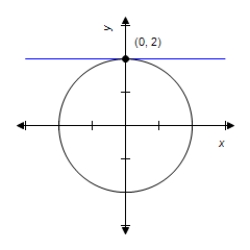
A) 0
B) 3
C) 5
D) 4
E) 7


A) 0
B) 3
C) 5
D) 4
E) 7

Unlock Deck
Unlock for access to all 84 flashcards in this deck.
Unlock Deck
k this deck
63
Find  for the equation
for the equation  by implicit differentiation and evaluate the derivative at the point
by implicit differentiation and evaluate the derivative at the point 
A)
B)
C)
D)
E) 0
 for the equation
for the equation  by implicit differentiation and evaluate the derivative at the point
by implicit differentiation and evaluate the derivative at the point 
A)

B)

C)

D)

E) 0

Unlock Deck
Unlock for access to all 84 flashcards in this deck.
Unlock Deck
k this deck
64
Assume that x and y are differentiable functions of t.Find  using the given values.
using the given values.  for
for  ,
, 
A) 216
B) 82
C) 164
D) 214
E) 107
 using the given values.
using the given values.  for
for  ,
, 
A) 216
B) 82
C) 164
D) 214
E) 107

Unlock Deck
Unlock for access to all 84 flashcards in this deck.
Unlock Deck
k this deck
65
Find  implicitly and explicitly(the explicit functions are shown on the graph)and show that the results are equivalent.Use the graph to estimate the slope of the tangent line at the labeled point.Then verify your result analytically by evaluating
implicitly and explicitly(the explicit functions are shown on the graph)and show that the results are equivalent.Use the graph to estimate the slope of the tangent line at the labeled point.Then verify your result analytically by evaluating  at the point.
at the point. 
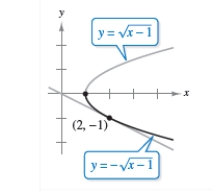
A) 
B) 
C) 
D) 
E) 
 implicitly and explicitly(the explicit functions are shown on the graph)and show that the results are equivalent.Use the graph to estimate the slope of the tangent line at the labeled point.Then verify your result analytically by evaluating
implicitly and explicitly(the explicit functions are shown on the graph)and show that the results are equivalent.Use the graph to estimate the slope of the tangent line at the labeled point.Then verify your result analytically by evaluating  at the point.
at the point. 

A)

B)

C)

D)

E)


Unlock Deck
Unlock for access to all 84 flashcards in this deck.
Unlock Deck
k this deck
66
The lengths of the edges of a cube are increasing at a rate of 4 ft/min.At what rate is the surface area changing when the edges are 21 ft long?
A) 96 ft2/min
B) 1,008 ft2/min
C) 504 ft2/min
D) 2,016 ft2/min
E) 84 ft2/min
A) 96 ft2/min
B) 1,008 ft2/min
C) 504 ft2/min
D) 2,016 ft2/min
E) 84 ft2/min

Unlock Deck
Unlock for access to all 84 flashcards in this deck.
Unlock Deck
k this deck
67
A point is moving along the graph of the function  such that
such that  centimeters per second. Find
centimeters per second. Find  when
when 
A) 
B) 
C) 
D) 
E) 
 such that
such that  centimeters per second. Find
centimeters per second. Find  when
when 
A)

B)

C)

D)

E)


Unlock Deck
Unlock for access to all 84 flashcards in this deck.
Unlock Deck
k this deck
68
A point is moving along the graph of the function  such that
such that  centimeters per second. Find
centimeters per second. Find  for the given values of x.
for the given values of x.

A) 
B) 
C) 
D) 
E) 
 such that
such that  centimeters per second. Find
centimeters per second. Find  for the given values of x.
for the given values of x.

A)

B)

C)

D)

E)


Unlock Deck
Unlock for access to all 84 flashcards in this deck.
Unlock Deck
k this deck
69
Volume and radius.Suppose that air is being pumped into a spherical balloon at a rate of 8 in.3/min.At what rate is the radius of the balloon increasing when the radius is 7 in.?
A) 
B) 
C) 
D) 
E) 
A)

B)

C)

D)

E)


Unlock Deck
Unlock for access to all 84 flashcards in this deck.
Unlock Deck
k this deck
70
Find the slope of the graph at the given point. 
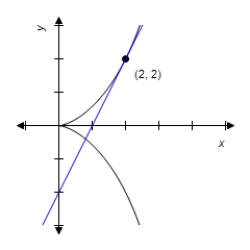
A) 2
B) 0
C) 1
D) 3
E) 5


A) 2
B) 0
C) 1
D) 3
E) 5

Unlock Deck
Unlock for access to all 84 flashcards in this deck.
Unlock Deck
k this deck
71
Assume that x and y are differentiable functions of t.Find  given that
given that  ,
,  ,and
,and 

A) -1.33
B) 1.5
C) 6
D) -8
E) 2.67
 given that
given that  ,
,  ,and
,and 

A) -1.33
B) 1.5
C) 6
D) -8
E) 2.67

Unlock Deck
Unlock for access to all 84 flashcards in this deck.
Unlock Deck
k this deck
72
Assume that x and y are differentiable functions of t.Given  ,find
,find  when
when  and
and 
A) 
B) 
C) 
D) 
E) 
 ,find
,find  when
when  and
and 
A)

B)

C)

D)

E)


Unlock Deck
Unlock for access to all 84 flashcards in this deck.
Unlock Deck
k this deck
73
Find the rate of change of x with respect to p.  ,
, 
A) 
B) 
C) 
D) 
E) 
 ,
, 
A)

B)

C)

D)

E)


Unlock Deck
Unlock for access to all 84 flashcards in this deck.
Unlock Deck
k this deck
74
The radius r of a sphere is increasing at a rate of 5 inches per minute.Find the rate of change of volume when  inches.Round your answer to one decimal place.
inches.Round your answer to one decimal place.
A) 1,809.6 cubic inches per minute
B) 7,238.2 cubic inches per minute
C) 36,191.1 cubic inches per minute
D) 9,047.8 cubic inches per minute
E) 27,143.4 cubic inches per minute
 inches.Round your answer to one decimal place.
inches.Round your answer to one decimal place. A) 1,809.6 cubic inches per minute
B) 7,238.2 cubic inches per minute
C) 36,191.1 cubic inches per minute
D) 9,047.8 cubic inches per minute
E) 27,143.4 cubic inches per minute

Unlock Deck
Unlock for access to all 84 flashcards in this deck.
Unlock Deck
k this deck
75
Let x represent the units of labor and y the capital invested in a manufacturing process.When 135,540 units are produced,the relationship between labor and capital can be modeled by  Find the rate of change of y with respect to x when
Find the rate of change of y with respect to x when  and
and 
A) -2
B) 0
C) 3
D) -7
E) 5
 Find the rate of change of y with respect to x when
Find the rate of change of y with respect to x when  and
and 
A) -2
B) 0
C) 3
D) -7
E) 5

Unlock Deck
Unlock for access to all 84 flashcards in this deck.
Unlock Deck
k this deck
76
Find  for the following equation:
for the following equation: 
A) 
B) 
C) 
D) 
E) 
 for the following equation:
for the following equation: 
A)

B)

C)

D)

E)


Unlock Deck
Unlock for access to all 84 flashcards in this deck.
Unlock Deck
k this deck
77
Find the rate of change of x with respect to p.  ,
, 
A) 
B) 
C) 
D) 
E) 
 ,
, 
A)

B)

C)

D)

E)


Unlock Deck
Unlock for access to all 84 flashcards in this deck.
Unlock Deck
k this deck
78
Find  for the equation
for the equation 
A) 
B) 
C) 
D) 
E) 
 for the equation
for the equation 
A)

B)

C)

D)

E)


Unlock Deck
Unlock for access to all 84 flashcards in this deck.
Unlock Deck
k this deck
79
Profit.Suppose that the monthly revenue and cost (in dollars)for x units of a product are  and
and  At what rate per month is the profit changing if the number of units produced and sold is 100 and is increasing at a rate of 10 units per month?
At what rate per month is the profit changing if the number of units produced and sold is 100 and is increasing at a rate of 10 units per month?
A) 11,960 per month
B) 1,160 per month
C) 1,960 per month
D) 760 per month
E) 19,960 per month
 and
and  At what rate per month is the profit changing if the number of units produced and sold is 100 and is increasing at a rate of 10 units per month?
At what rate per month is the profit changing if the number of units produced and sold is 100 and is increasing at a rate of 10 units per month? A) 11,960 per month
B) 1,160 per month
C) 1,960 per month
D) 760 per month
E) 19,960 per month

Unlock Deck
Unlock for access to all 84 flashcards in this deck.
Unlock Deck
k this deck
80
Find  implicitly for
implicitly for 
A) 
B) 
C) 
D) 
E) 
 implicitly for
implicitly for 
A)

B)

C)

D)

E)


Unlock Deck
Unlock for access to all 84 flashcards in this deck.
Unlock Deck
k this deck


